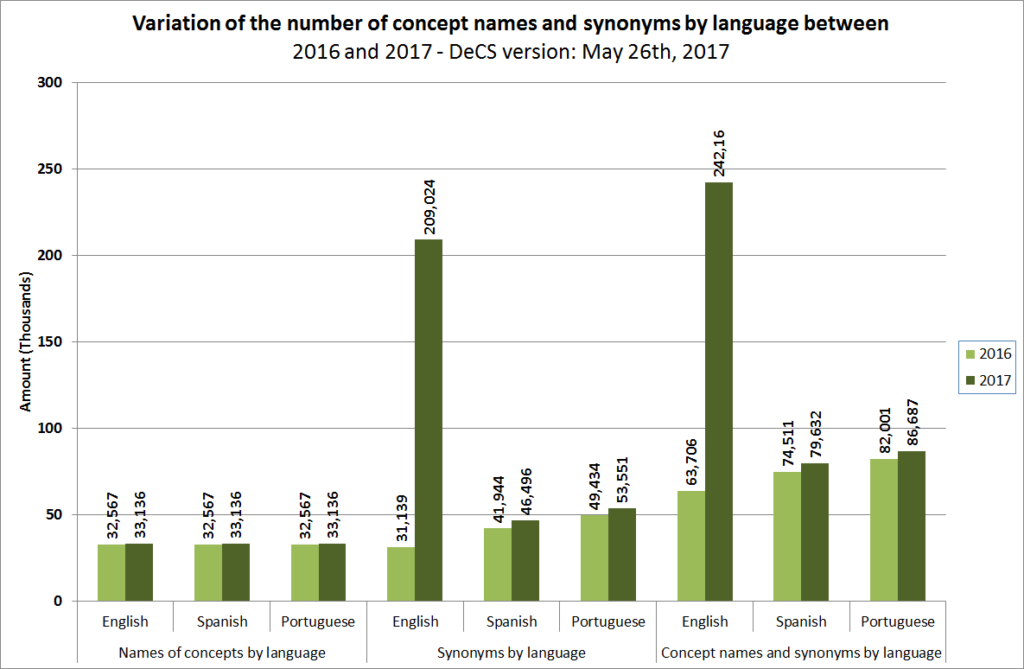DeCS (Health Sciences Descriptors), as a controlled and structured vocabulary in health, available in English, Portuguese and Spanish, provides a unique language that organizes and facilitates access to scientific literature in health sciences in Latin America and the Caribbean.
Its origin goes back to the end of 1970s, when BIREME/PAHO/WHO started to collaborate with the National Library of Medicine (NLM) of the United States on the translation and adaptation of the MeSH vocabulary (Medical Subject Headings) to Spanish and Portuguese. Once the need to expand the vocabulary offered at that time by the NLM was identified, BIREME has developed and kept – in three languages – in an integrated and compatible manner with MeSH, other specific areas such as Public Health, Health Surveillance, Homeopathy and Health and Science, originating, thus, DeCS.
DeCS, as a specific thesaurus on health sciences is a terminology control instrument able to translate the natural language of health documents into a more systemic language made of descriptors, synonyms and qualifiers, all semantically and logically related. Thus, it is an integrating tool to organize and access health scientific and technical information, because DeCS terms will then become the common language used in the processes to describe and retrieve documents on the main health sciences databases internationally, such as MEDLINE and LILACS, available at the Virtual Health Library (VHL).
DeCS update is done in agreement with the annual MeSH update and it involves the inclusion of new descriptors and the removal and repositioning of others. Its most recent version, available since May 2017, has a new feature: as from 2017, MeSH will have more synonyms in comparison with previous years. The graph below shows the increase by more than 570% of the number of synonyms in English of terms that already existed in the DeCS database. This also had an impact on the number of synonyms of new descriptors translated into Spanish and Portuguese, a much higher number than the average in recent years.

In absolute numbers, DeCS received 177,885 new synonyms in English, 4,552 in Spanish, and 4,117 in Portuguese. This achievement increases the possibility of retrieving a higher number of documents on a bibliography search in the VHL, and its main beneficiaries are the users from the English-speaking Caribbean countries, who represent a priority for the Pan-American Health Organization regarding technical cooperation.
BIREME is in charge of translating these terms, their synonyms, scope and indexing notes into Portuguese. It is also responsible for reviewing the translation into Spanish done in cooperation with the Facultad de Medicina de la Universidad de Chile (for Latin American and Caribbean Spanish) and with the Biblioteca Nacional de Ciencias de la Salud del Instituto de Salud Carlos III (for European Spanish). Moreover, BIREME carries out hierarchical changes implemented by MeSH and it arranges DeCS’ exclusive terminology. There are 33,136 descriptors overall, of which 28,552 are from MeSH and 4,584 are DeCS exclusive.
Since 2016, BIREME has offered the possibility of doing searches using MeSH terms in French, with the inclusion of their translation by the Institut National de la Santé et de la Recherche Médicale (Inserm), in the searching mechanisms of the VHL. The same applies to DeCS exclusive terms, as a result of the translation work made by the Department of Medical Computing at the University Hospital of Rouen, in France, which was the subject matter of a Memorandum of Understanding signed with BIREME.
The effort of keeping DeCS up-to-date is also associated with the need for organizing and accessing the more than 26 million documents available at the VHL, according to the context of priorities of the technical cooperation with PAHO/WHO. And this is the reason why BIREME, in collaboration with experts from LA&C, is reviewing the DeCS for updating and inclusion of descriptors and synonyms related to cross-sectional topics, such as gender, equity, human rights and ethnicity.
The importance of DeCS in democratizing access to health information is clearly seen throughout its history, since its creation, at the end of the 1970s. The fact that it has been kept updated and relevant explains why it has already gone beyond the geographical continental barrier of LA&C, and it has even supported the organization and access to health information in the Community of Portuguese-Speaking Countries (CPSC), in Spain, and in French-speaking countries.